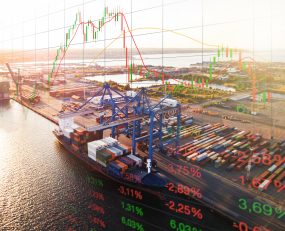
On 15th March 2022, the Biden administration and U.S. Department of Transportation launched a pilot program to have ocean carriers, ports, and retailers share data with each other to improve the flow of goods, speed up delivery times and ease supply chain congestion. The initiative is called Freight Logistics Optimization Works (FLOW) and includes eighteen participants, including port authorities, warehousing, and logistics companies. Big names such as the Ports of LA and Long Beach, MSC, CMA CGM, Target, FedEx, UPS and C.H. Robinson are among the companies that have already signed up to the initiative.
While it is certainly a positive thing that the U.S. administration continues its efforts to tackle supply chain congestion, the success of the initiative is dependent on several factors. Scale is important for ventures of this type and therefore more participants are needed to build out the data exchange. It is also necessary to bring on board companies with physical assets, such as trucking and railroad companies, as well as software companies, which can provide deeper insights into supply chain data and visibility.
The FLOW initiative complements the Bipartisan Infrastructure Law (BIL) which envisages generational investment in US ports, highways, and other parts of physical infrastructure, and aims to speed up the movement of goods and lower costs.
These two initiatives build on a series of other ongoing efforts by the US administration to tackle supply chain bottlenecks and rising costs by leveraging the Ocean Shipping Reform Act 2021 and antitrust laws. The Ocean Shipping Reform Act 2021 is a particularly important bill as it is designed to sharpen US federal oversight of ocean carriers and intensifies the government’s offensive against the shipping industry. The bill is headed for a Senate vote after getting bipartisan approval by the US Senate Commerce Committee last week.
Industry groups have welcomed the bill and claim that it would help keep U.S. exports viable in foreign markets by preventing “unfair” ocean carrier practices such as exorbitant freight rates, declined booking requests, and unreasonable freight and demurrage/detention charges. If approved, the legislation would also essentially empower the Federal Maritime Commission with more authority to regulate ocean carrier practices, in response to complaints from shippers and manufacturers.
Not surprisingly, the World Shipping Council, an ocean carrier trade group, opposes the bill and stated that “instead of passing legislation that would do nothing to address the nation’s supply chain congestion, Congress should seek real solutions that take a comprehensive, forward-looking view. That means continued investment in port infrastructure and promoting communication, innovation, and collaboration across sectors to further strengthen the intermodal transportation system that has supported the U.S. economy throughout the pandemic.”
But Biden’s administration seems determined to block mergers it views as anticompetitive and that harm the supply chain. Earlier this week, Cargotec and Konecranes, both listed Finnish makers of cranes and other cargo handling equipment, abandoned a $5bn merger just hours before the U.S. Justice Department was set to file suit. The merger would have eliminated competition for shipping container handling equipment used by port customers, stated the Justice Department’s Antitrust Division.
Overall, the most recent initiatives demonstrate the strong commitment of the U.S. administration to strengthen critical supply chains. It is stepping up investments in both digital and physical infrastructure, but also its scrutiny on container shipping alliances. It is attempting to regulate an industry that has been allowed to operate without any intense regulation for a long time in order to bring down shipping costs, when in reality, bigger economic forces, such as soaring consumer demand and persistent bottlenecks, are at work.
Source: Transport Intelligence, March 31, 2021
Author: Violeta Keckarovska